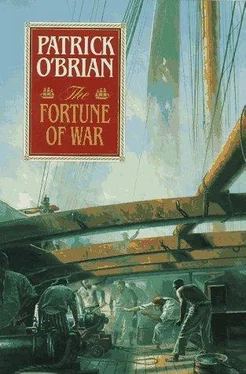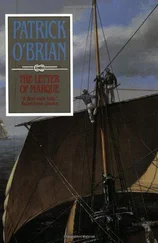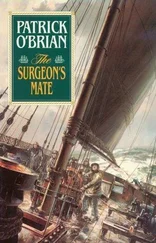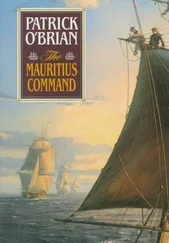Patrick O'Brian - The fortune of war
Здесь есть возможность читать онлайн «Patrick O'Brian - The fortune of war» весь текст электронной книги совершенно бесплатно (целиком полную версию без сокращений). В некоторых случаях можно слушать аудио, скачать через торрент в формате fb2 и присутствует краткое содержание. Жанр: Книги. Описание произведения, (предисловие) а так же отзывы посетителей доступны на портале библиотеки ЛибКат.
- Название:The fortune of war
- Автор:
- Жанр:
- Год:неизвестен
- ISBN:нет данных
- Рейтинг книги:3 / 5. Голосов: 1
-
Избранное:Добавить в избранное
- Отзывы:
-
Ваша оценка:
- 60
- 1
- 2
- 3
- 4
- 5
The fortune of war: краткое содержание, описание и аннотация
Предлагаем к чтению аннотацию, описание, краткое содержание или предисловие (зависит от того, что написал сам автор книги «The fortune of war»). Если вы не нашли необходимую информацию о книге — напишите в комментариях, мы постараемся отыскать её.
The fortune of war — читать онлайн бесплатно полную книгу (весь текст) целиком
Ниже представлен текст книги, разбитый по страницам. Система сохранения места последней прочитанной страницы, позволяет с удобством читать онлайн бесплатно книгу «The fortune of war», без необходимости каждый раз заново искать на чём Вы остановились. Поставьте закладку, и сможете в любой момент перейти на страницу, на которой закончили чтение.
Интервал:
Закладка:
The meal drew to an end: Diana and Louisa Wogan retired. 'I wonder how they will like each other's company,' thought Stephen as he held the door for them to pass. The men sat for a while, talking of Boston's subscription for the Muscovites who had suffered from the burning of their city, and of the attitude of the King of Prussia. 'It is shocking how little our public men know about conditions in Europe,' observed Johnson, and before they went into the drawing-room he said privately, 'Dr Maturin, if you are not engaged this evening I should very much like to have a word with you. This afternoon I must see Captain Aubrey - an official matter to do with his exchange - and some Frenchmen; but I do not suppose it will take very long. Could you perhaps sit drinking tea with Mrs Villiers until I return?'
'I should be very happy,' said Stephen.
He and Herapath walked into the drawing-room, where Diana and Louisa were sitting at some distance from one another; silently smoking long thin cigars. Herapath was a little unsteady on his legs, a little elevated in his spirits, and he thought fit to recite his version of a T'ang poem dealing with the emotions of a Chinese princess married for political reasons to a barbarian, the leader of a horde that lived brutishly in Outer Mongolia; and in his enthusiasm he had a tendency to stumble over the words. The women listened to him, Louisa with amused and kindly tolerance, Diana with a certain shade of contempt. Stephen did not listen at all.
He had felt a good many miseries in his time, but none to be compared to this cold vacancy within. His observation of her had confirmed his suspicions of the day before and provided reasons for the first instinctive feeling. He did not love Diana Villiers any more, and it was death to him. Something in her essence had changed, and the woman who poured out the tea and talked was a stranger, all the more a stranger because of their former intimacy. The evident change was that anger and ill-humour, disappointment and frustration, had hardened her: her face was lovely, yet its expression in repose was not amiable. Louisa Wogan did not possess a tithe of Diana's style or beauty; she was on a smaller scale entirely; but her cheerfulness, her humour, and her willingness to be pleased made a painful contrast. The important change was far more profound, however: it was as though Diana's spirit had diminished and her courage had begun to fail, if indeed it had not already broken.
To be sure, her position was difficult and extraordinary courage would have been needed to deal with it; but then he had always looked upon Diana as a woman, a being, possessed of extraordinary courage. Without courage she was not Diana. But then again, he said (his mind changing direction), there was the physical aspect to be considered: if costiveness could affect a man's courage, how much more might an adverse phase of the moon affect a woman's? He looked secretly at her face for signs that would support this notion and indeed for encouragement, but to his dismay he found that his intelligence rejected the moon and all its influence, and merely recorded an impression that the high carriage of her head, the straightness of her back he had so much admired and for so long, now appeared slightly exaggerated, the effect of indignation, of a sense of ill-usage. If, as he supposed, her spirit had been damaged, and if from strong she had become weak, then the common vices of weakness would naturally ensue. It would not be surprising to find petulance, ill-temper, and even, God forbid, self-pity, falseness, a general debasement.
Herapath's voice had changed from the solemn mooing of recital: it must have changed some time before without Stephen's noticing it, since the present discussion or rather argument between him and Louisa about Caroline's feeding-time and the proper persons to be entrusted with it was already well advanced.
In time, Herapath, supported by Diana, prevailed, and there was a general move towards the door. 'Louisa is such a devoted mother,' said Diana. 'You would swear she was made for feeding babies: I am sure it must be her greatest delight. Is it not, Louisa?'
With some warmth Louisa observed that only those women who possessed babies could appreciate these things at their just value, and Stephen was tortured by the thought that Diana might answer with some reflection upon Louisa's manner of coming by her child; but she only said, 'Oh, my dear, before you go into the street I must just tell you that your petticoat is showing. It was disgraceful of me not to have mentioned it before dinner; though to be sure no one minds such things in a nursing mother.
'Lord, Stephen,' she said, returning, 'I am so sorry to have inflicted such a boring dinner-party on you. You have enough to bear as it is. But at least now we can talk.'
She talked with the absolute openness and freedom that Stephen had so envied, for there at her side, as she supposed, was the loving receptive ear: and certainly he listened with grave attention and concern. His friendship for her was quite intact, and it contained a large element of tenderness.
Her relationship with Johnson had been uneasy from the start: even if it had not been for the interminable business of his divorce their connection could never have lasted - he was violent, dangerous, and he could be perfectly ruthless; at ordinary times he was ill-tempered, far too rich for his own good; he was a philanderer, and his behaviour to his blacks was revolting.
'I suppose the actual sight, the daily experience, of slavery must be very hard to bear,' said Stephen, 'particularly on the industrial scale of a large plantation.'
'Oh, as for that,' said she, shrugging, 'it seems to me natural enough: there were quantities of them in India, you know. I should have said his black women. Any number of the mulatto children about the house in Maryland were his, and the older ones were his halfbrothers or -sisters; and there were a couple of octaroon girls, cousins I dare say, who looked at me in such an odiously familiar, knowing way - I could not bear it - I felt like something that had been bought. The fellow was a perfect parish bull.'
'The parish bull slumbers in most of us, I fear.'
'It never slumbers in Johnson at any moment, I do assure you. And at the same time he is absurdly jealous, a perfect Turk. All he lacks is a beard and a turban and scimitar,' she said, with a ghost of her old smile. 'None of the black girls he has tossed the handkerchief to is ever allowed to marry, and he made me such scenes for talking to another man that you would never believe. I really think he would kill me and you too if he saw me do this.' She laid her hand affectionately on his. 'My God, Maturin,' she said, pressing it, 'what a relief it is to have somebody you can really trust and rely upon.'
It was after one of these scenes that she left him and came to London. He followed her: he was good, quiet, kind, full of promises of reform; he showed her lawyers' letters that made it seem that his divorce was very near. 'And he gave me these diamonds,' she said, unclasping the necklace and tossing it on to the couch, where it blazed and glittered like a phosphorescent wake. 'They were his mother's, and he had them reset. The big one in the middle is called the Begum. I suppose it is disgraceful to admit that they had an influence on me, but they did. Perhaps most women like diamonds.'
It was in London, or rather in their precipitate flight from London, that she learnt that Johnson was connected with American intelligence: but even then she had never imagined for a moment that what he did was in any way directed against England - she thought it was to do with stocks and shares and government funds in Europe, particularly as at that time there was a general idea that the United States would go to war with France. He terrified her, however, by saying that she was implicated, that Government would take her up and hang her for having passed papers on to Louisa Wogan, so like a fool she agreed to go back with him to America. She had received letters for Louisa, and she had passed them on; but she had thought it was only an intrigue until Louisa was arrested and she herself was taken to the Home Office and questioned for hours on end. She lost her head and ran off with Johnson.
Читать дальшеИнтервал:
Закладка:
Похожие книги на «The fortune of war»
Представляем Вашему вниманию похожие книги на «The fortune of war» списком для выбора. Мы отобрали схожую по названию и смыслу литературу в надежде предоставить читателям больше вариантов отыскать новые, интересные, ещё непрочитанные произведения.
Обсуждение, отзывы о книге «The fortune of war» и просто собственные мнения читателей. Оставьте ваши комментарии, напишите, что Вы думаете о произведении, его смысле или главных героях. Укажите что конкретно понравилось, а что нет, и почему Вы так считаете.












